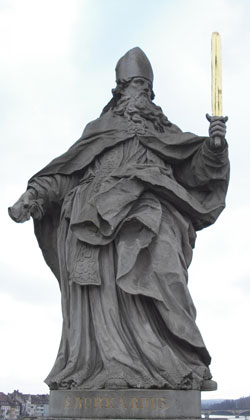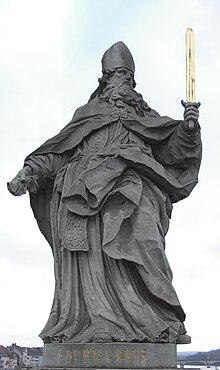
Feastday: October 14
Death: 754
Disciple of St. Boniface and a missionary to Germany. Burchard was a priest of Wessex, England, and a Benedictine. In 732, he went to Germany, serving under St. Boniface who consecrated him the first bishop of Würzburg. In 749, Burchard was sent by the Frankish King Pep in the Short to Rome, where he received Pope St. Zachary's approval of Pepin's accession to the Frankish throne. After founding the abbey of St. Andrew's, Burchard resigned from his see around 753. He retired to Hamburg, Germany, and the monastic life, dying there on February 2.
 The statue of Saint Burchard on Würzburg's Alte Mainbrücke.
The statue of Saint Burchard on Würzburg's Alte Mainbrücke.
Burchard of Würzburg (in German Burkard or Burkhard) was an Anglo-Saxon missionary who became the first Bishop of Würzburg (741–754).
He was an Anglo-Saxon who left England after the death of his parents and joined Boniface in his missionary labors, some time after 732. When Boniface organized bishoprics in Middle Germany, he placed Burchard over that of Würzburg; his consecration can not have occurred later than the summer of 741, since in the autumn of that year, he was documented as officiating as a bishop at the consecration of Willibald of Eichstädt.
Pope Zachary confirmed the new bishopric in 743. Burchard appears again as a member of the first German council in 742, and as an envoy to Rome from Boniface in 748. With Fulrad of Saint-Denis, he brought to Zachary the famous question of Pepin, whose answer was supposed to justify the assumption of regal power by the Carolingians.
In 751, he resigned his see in favor of Megingoz, a Benedictine monk from St. Peter's Abbey in Fritzlar, and retired to a life of solitude.
His feast day is 14 October.





